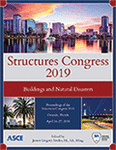Structures Congress 2019
Topology Optimization of Truss Structures Considering Stress and Stability Constraints
Publication: Structures Congress 2019: Buildings and Natural Disasters
ABSTRACT
Topology optimization is a free-form approach to designing efficient structural layouts. Although highlighted repeatedly in literature for its ability to identify creative, high performance designs, it is also well known that oversimplification of the underlying optimization formulation can lead to impractical structural solutions. A common truss optimization problem formulation is to minimize linear elastic strain energy for to a given structural mass (or minimize mass subject to a linear elastic deformation constraint). The optimal solutions obtained from such a formulation may often include thin members that cannot resist yielding or local buckling, and/or may include colinear members with unbraced hinges that destabilize the structure. Such solutions are, of course, impractical from structural engineering perspective. Incorporating stress and local (member) buckling constraints into the problem formulation to satisfy strength and stability requirements has been studied in literature and involves significant fundamental challenges. The authors review and discuss these challenges in this paper and extend an existing disaggregated formulation to include global (system) buckling constraints. The impact of each of these constraints on the optimized solution when applied independently as well as simultaneously is demonstrated for simple truss design problems. Although the algorithm is currently being scaled up to large design domains, the presented results clearly show that the incorporation of stress and local and global stability constraints results in more realistic design solutions.
Get full access to this article
View all available purchase options and get full access to this chapter.
ACKNOWLEDGEMENTS
This work was made possible by NPRP #7-1518-2-549 from the Qatar National Research Fund (a member of Qatar Foundation). The statements made herein are solely the responsibility of the authors.
REFERENCES
Achtziger, W. (1998). “Multiple load truss topology and sizing optimization: some properties of minimax compliance.” J Optim Theory Appl, 98, 255-280.
Asadpoure, A., Guest, J. K., & Valdevit, Lorenzo. (2015). “Incorporating fabrication cost into topology optimization of discrete structures and lattices.” Struct Multidisc Optim, 51, 385-396.
Cheng, G. D. & Jiang, Z. (1992). “Study on Topology Optimization with Stress Constraints.” Eng Optim, 20 (2), 129-148.
Cheng, G. D. & Guo, X. (1997). “ɛ-relaxed approach in structural topology optimization.” Struct Optim, 13, 258-266.
Guest, J. K. & Igusa, T. (2008). “Structural optimization under uncertain loads and nodal locations.” Comput Methods Appl Mech Eng, 198, 116-124.
Guo, X., Cheng, G. D., & Yamazaki, K. (2001). “A new approach for the solution of singular optima in truss topology optimization with stress and local buckling constraints.” Struct Multidisc Optim, 22, 364-372.
Guo, X. & Cheng, G. D. (2004). “Epsilon-continuation Approach for Truss Topology Optimization.” Acta Mechanica Sinica, 20 (5), 526-533.
Jalalpour, M., Igusa, T., & Guest, J. K. (2011). “Optimal Design of Trusses with Geometric Imperfections – Accounting for Global Instability.” Int J Solids Struct, 48, 3011-3019
Koh, S. et al. (2017). “Structural topology optimization considering complexity.” Proc., Structures Congress 2017, ASCE, Denver, CO, 192-201.
Stolpe, M. & Svanberg, K. (2001). “On the trajectories of the epsilon-relaxation approach for stress-constrained truss topology optimization.” Struct Multidisc Optim, 21, 140-151.
Stolpe, M. & Svanberg, K. (2003). “A note on stress-constrained truss topology optimization.” Struct Multidisc Optim, 25, 62-64.
Information & Authors
Information
Published In
Structures Congress 2019: Buildings and Natural Disasters
Pages: 49 - 58
Editor: James Gregory Soules, McDermott International
ISBN (Online): 978-0-7844-8222-3
Copyright
© 2019 American Society of Civil Engineers.
History
Published online: Apr 22, 2019
Published in print: Apr 22, 2019
Authors
Metrics & Citations
Metrics
Citations
Download citation
If you have the appropriate software installed, you can download article citation data to the citation manager of your choice. Simply select your manager software from the list below and click Download.
